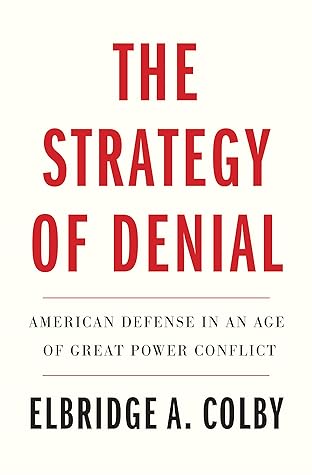More on this book
Kindle Notes & Highlights
Read between
February 9 - February 9, 2023
Importantly, a strategy is a framework, not a master plan. It is predicated on a coherent view of the world and provides a logic within which to make choices and prioritize. It is, at its heart, a simplifying logic to deal with a complex world that would otherwise be bewildering. Strategy, in this sense, is like any good theory meant to help explain the world—it should be as simple as possible, but no simpler.
Denying China hegemony over Asia is therefore the cardinal objective of US grand strategy.
What matters most, however, is not American credibility in some general sense—that is, upholding every pledge or promise the United States has ever made, however imprudent—but US differentiated credibility in Asia: the degree to which important actors in the region believe that the United States will defend them effectively against China.
The top priority for the US defense establishment should be ensuring that China cannot subordinate a US ally or quasi-ally in Asia, with the first priority being developing and maintaining the ability to conduct a denial defense of Taiwan.
The most plausible form by which a state could accumulate such power is hegemony, meaning that a state exercises authority over other states and extracts benefits from them, but without the responsibilities or risks of direct control.
Because of Asia’s size and military-economic potential, ensuring that it is not subjected to such hegemony is of primary importance for the United States.
Essentially every aspiring hegemon in history has sought or planned to establish an economic system favoring itself, in order to enrich itself, sustain its predominance, and exclude or disfavor potential competitors.
Thus the United States might be more powerful than China in global terms, but if China were better able to project its power in Asia, or willing to fight harder and risk more to attain its goal than Washington was willing to commit to deny it, it could establish predominance over the region. This is why the regional balance of power is so critical.
The goal of an anti-hegemonic coalition, then, is to prevent an aspiring hegemon like China from dominating a region like Asia by convincing important states that it would prevail in a systemic regional war. The aspirant’s goal is positive: establishing predominance. The coalition’s goal, by contrast, is negative: denial.
France and the Low Countries but were surprised
China thus requires a strategy that discourages other nations from joining or remaining in the anti-hegemonic coalition. Beijing must be able to penalize other nations so that they judge that the costs and risks of joining outweigh the benefits. It can draw on diplomatic, economic, and other nonmilitary instruments of national power to fashion these penalties. But, crucially, China is very unlikely to succeed in attaining regional hegemony if the penalties do not include a core military component, given the unique coercive efficacy of force and the exceedingly high stakes for states seeking to
...more


